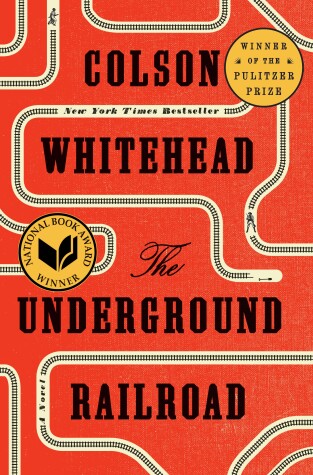Reviewed by gmcgregor on
Set in the antebellum South, The Underground Railroad focuses on the journey of one slave woman, Cora, towards freedom. The granddaughter of a woman who survived the Middle Passage and was enslaved in Georgia, and the daughter of a slave who ran away when she was just a child, Cora has spent much of her life as an outcast even among her own community. So she's surprised when another slave, Caesar, approaches her to run away with him to find the Underground Railroad. In Whitehead's alternative history, the railroad is literal...there are stations built into the earth that spirit slaves away to the north.
Run away they do, and Cora finds herself first in South Carolina, which in this world has outlawed slavery but holds ownership of Black people itself, and then distributes them as it sees fit in service work. But they're also secretly infecting men with syphilis to study it, and sterilizing women...and then Cora finds out she's being chased by a man called Ridgeway, a slave catcher. So the next stop is North Carolina, which has abolished slavery too...out of a fear that the Black majority population of the state will rebel against their masters. It's replaced their labor with white indentured servants, and escaped slaves are publicly executed. Cora hides there for a while, but before she can devise an escape, she's caught by Ridgeway. That doesn't mean she stops fighting for her freedom, but freedom isn't an easy thing for a slave to find.
I wanted to love this. I wanted to find it a revelation. And it's good, very good actually. Whitehead's prose is both lovely and powerful. And I understand why he can't "go easy" on Cora...it reads sometimes like she's a punching bag for the universe and she barely gets room to breathe before she's knocked down again, but that's probably what it feels like to be African-American, obviously back then and to a lesser but still very real degree even now. And the characters are interesting, with Whitehead even writing one-off chapters from perspectives other than Cora's, to give us context for the people who have an impact on Cora's life and where they're coming from when they interact with her.
But I just never connected with and got emotionally invested in the novel the way I do for the books that distinguish themselves for me as "great". I cared only in a kind of distant way about Cora, and for all that the side characters were developed they mostly just faded away...when Caesar and Cora are separated relatively early in the proceedings, for instance, I never found myself missing him on the page. And while I cared about Cora and what was going to become of her, it was never in the way where I wanted to skip ahead to see how she might make it around each obstacle thrown in her path. I'm not quite sure why that was, honestly...like I said, Whitehead's writing is incredible so it's not for any lack of ability to make her more compelling on his part. It just didn't quite get there for me. Nevertheless, it's a very good and powerful book, and one that I'd recommend to just about everyone.
Reading updates
- Started reading
- 11 November, 2017: Finished reading
- 11 November, 2017: Reviewed
